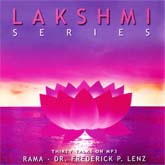
Lakshmi Series
The Yoga of Selfless Giving
Why aren't you happy? Why aren't you satisfied with your life?
Deep down inside you know that you're not really happy or satisfied or free. You're entangled in a mass of emotions, you're bombarded by thoughts and ideas that don't make you happy, you live in a world gone mad, where people use technology to find faster and more efficient ways to kill each other, where in every home there's cruelty and unhappiness, where love is just another four-letter word for fulfillment of desire, where beauty is laughed at, purity stained, humility ignored.
Why aren't you happy? Why aren't all of you happy when there's so much to have and so much to be? The reason is very simple. At the root of all problems we find one causal answer - self-giving. The reason you're not happy, the reason the world lacks peace, the reason that we cannot find ourselves, is that we lack happiness - happiness that comes from self-giving.
We have two choices in life. These are the north and south poles of our existence. One choice in life is to fulfill ourselves, the limited self, to do things that make us feel better, to do things that give us pleasure and not pain, to fulfill our desires, to get the things that we want each day, each year, to make ourselves happy. The other alternative is to make others happy, to forget ourselves, to ignore our wants, to not be concerned with whether we're happy or not, but rather to take the time and energy that we would utilize in fulfilling ourselves and use it to make others happy. These are our two choices.
From a logical point of view, it would certainly seem that the former rather than the latter is the best course to follow if one seeks happiness. It would seem that hours and hours spent in service to others would be drudgery, that we would become the slave of another person, that there would be very little fulfillment in always working for others. Whereas when we take the time to do the things that we like to do - to go to places we want to go, to be with whom we would like to be, to succeed at the things that we feel we should succeed at, to avoid the things that we consider painful - it would seem that this would be the proper way to become happy.
Strangely enough, it's not. It's just the opposite. And if you don't believe me, look at the world and look at its people. You will find only a handful of people in this world who are really happy, who have deep and lasting joy. Everyone else experiences a superficial happiness, which is here one hour and gone the next, which is followed by depression, each elation is followed by frustration. There is only a very small group of persons in this world who live in a transcendental awareness and are really happy from the depths of their soul. These are persons who elected, at some point in their existence, to take their existence and give it to God, to give it away, to give it to eternity. They are happy - happy in their self-giving. Whereas those who pursue a worldly life, who try to make money so that they can get the things they want, who try to get others to do what they want, to perform for them, who use and abuse in the name of happiness, their own happiness, are miserable.
Whenever you do something for yourself exclusively you're not happy. Whenever you give to others with no motivation for self-happiness, not even subconsciously, then you become free. Why is this? This is a strange state of affairs, it would seem. How could this be so? Well, it's really not too hard to understand, but first we have to take a look at the nature of consciousness and existence and what it is to be a being, and also a brief survey, perhaps, of nonbeing.

